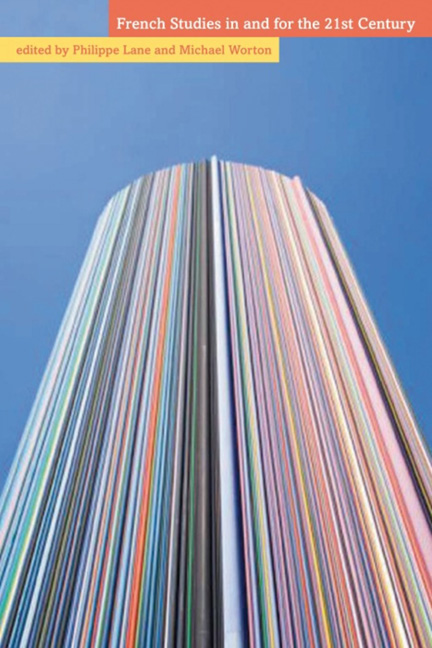Book contents
- Frontmatter
- Contents
- Notes on Contributors
- Foreword
- Foreword by His Excellency
- Part I: Contextualisations
- Part II: Research and Public Engagement Strategies
- Part III: The Place of Women and Gender in French Studies
- Part IV: The Place of Literature
- 9 Integrated Learning: Teaching Literature in French
- 10 Oxford, Theatre and Quarrels
- 11 Defining (or Redefining) Priorities in the Curriculum when the Good Times have Flown
- Part V: The Place of Linguistics in French Studies Today
- Part VI: Theatre, Cinema and Popular Culture
- Part VII: Area Studies, Postcolonial Studies and War and Culture Studies
- Part VIII: Adventures in Language Teaching
- Appendices. Addresses to the Future of French Studies Conference
10 - Oxford, Theatre and Quarrels
from Part IV: The Place of Literature
- Frontmatter
- Contents
- Notes on Contributors
- Foreword
- Foreword by His Excellency
- Part I: Contextualisations
- Part II: Research and Public Engagement Strategies
- Part III: The Place of Women and Gender in French Studies
- Part IV: The Place of Literature
- 9 Integrated Learning: Teaching Literature in French
- 10 Oxford, Theatre and Quarrels
- 11 Defining (or Redefining) Priorities in the Curriculum when the Good Times have Flown
- Part V: The Place of Linguistics in French Studies Today
- Part VI: Theatre, Cinema and Popular Culture
- Part VII: Area Studies, Postcolonial Studies and War and Culture Studies
- Part VIII: Adventures in Language Teaching
- Appendices. Addresses to the Future of French Studies Conference
Summary
Oxford University's French subfaculty occupies a rather unusual position in the network of French Studies in the UK: the size of the department, the collegiate structure of the university, and certain of its very specific traditions all contribute to this singularity. But in recent years this department has, like so many others, undergone a series of necessary changes; some of them welcome and others less so. Certain of these changes will doubtless require development in the coming years: it is these changes that form the subject of this chapter.
It begins with a rapid overview, rendered absolutely necessary by the singularities mentioned above. But the function of this quick sketch, which does not claim to be exhaustive, is largely to provide a background for two proposals, addressed in the two subsequent sections. In keeping with the spirit of this volume, this is not an attempt to present a complete survey of the activities of the department; rather the aim is to focus on specific case studies. The two evoked here concern the early modern period, which is one of the sectors most beset with worries for the future. It should be emphasised that this is merely one viewpoint: both the overview and the choice of examples are clearly based on the author's (or the authors’) own experience, and represent only his (or their) opinion. Equally, the resulting suggestions are simply intended to provide material for wider reflection.
Overview
The French subfaculty at Oxford comprises more than 30 postholders (31 or 35, including the specialists in French linguistics, who are also attached to the linguistics faculty). To this we add college lecturers, a peculiarity of the Oxford collegiate system (their number can vary, but only within certain limits, and the current total stands at 18), junior research fellows, and visiting professors and researchers occupying set posts. In all, then, a faculty of somewhere in the region of 60 people involved in teaching and research. The size of the department enables it to cover every period of literature (from the medieval to the present day), and a whole range of specific themes (including womens’ studies, francophone studies and cinema).
- Type
- Chapter
- Information
- French Studies in and for the 21st Century , pp. 118 - 128Publisher: Liverpool University PressPrint publication year: 2011



